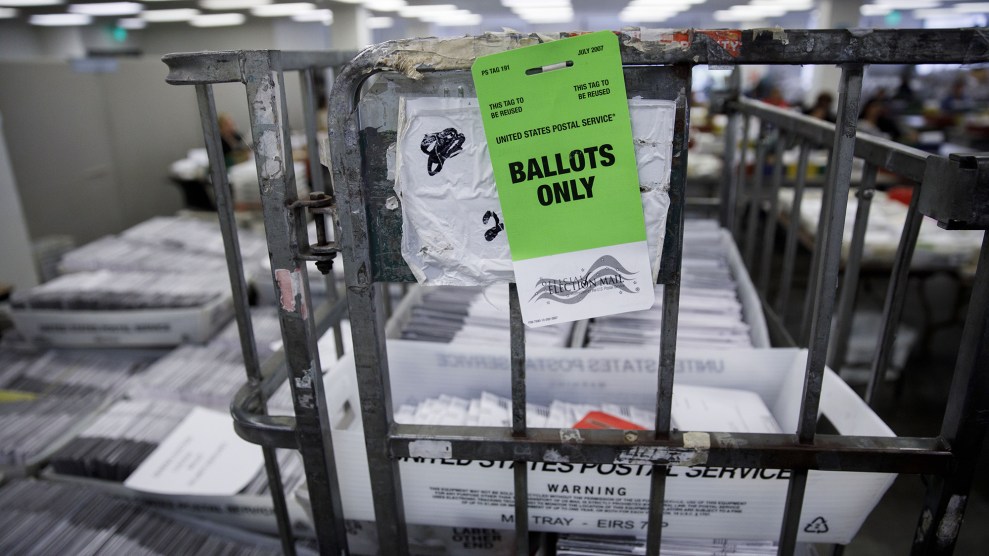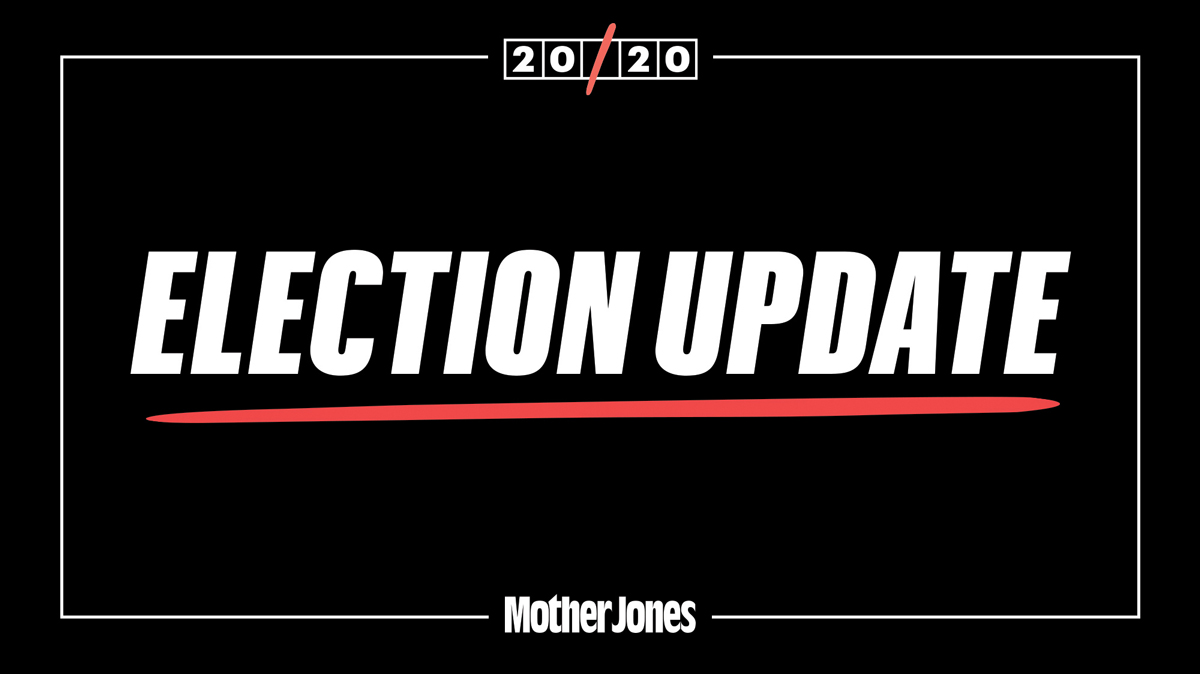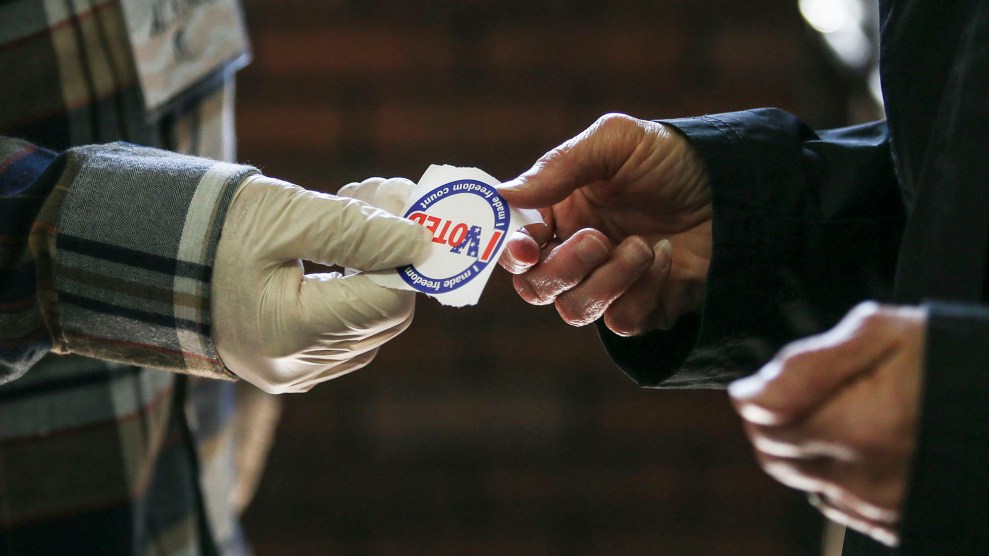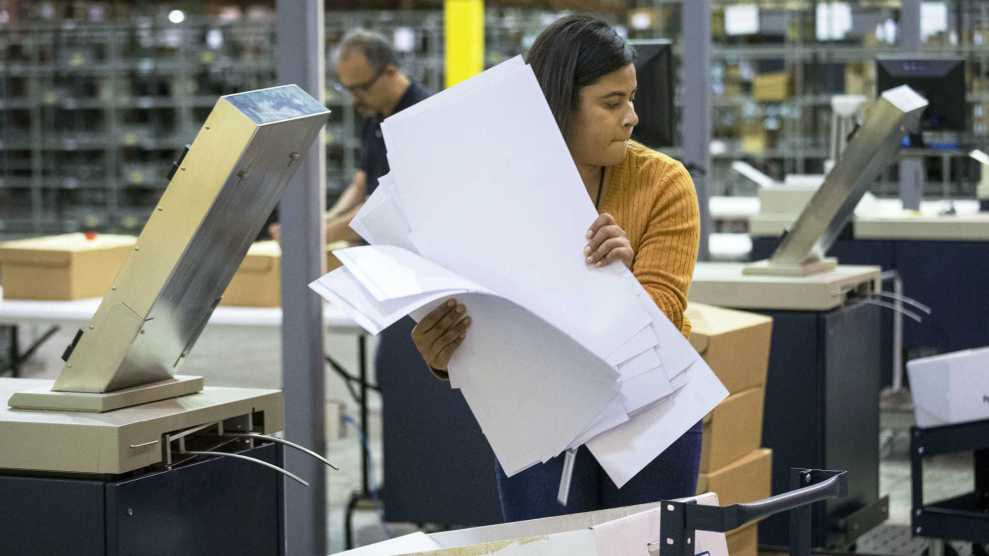
atrick Fallon/ZUMA Wire
As officials in multiple states have postponed primary elections in the midst of the coronavirus crisis, and with some experts predicting a resurgence of the virus this fall, there have been widespread discussions about preserving the November elections while protecting public health.
The wider adoption of vote-by-mail systems, where every registered voter is automatically mailed a blank ballot, has been pushed as a fair response to a pandemic that has both disrupted and homebound millions of people.
But there are challenges, chief among them, dwindling time. For a dose of reality, I caught up with Amber McReynolds, CEO of Vote at Home, a nonprofit organization focused on promoting vote-by-mail and no-excuse absentee voting systems. McReynolds, who was the director of elections for the City and County of Denver under the transition to Colorado’s mail system, explained how states trying to quickly make the same pivot should consider centralizing efforts, how a crush of postal votes could stress counting, and why President Trump’s critique of the practice rings hollow.
While the push for increased vote-by-mail elections has been going on for a long time, it’s really having a moment now.
The pandemic and this public health crisis has exposed the real vulnerabilities that exist in the in-person voting structure that many states still rely on. There are states that still require an excuse to get an absentee ballot, there are states that haven’t adjusted their voting laws around mail ballot voting for decades. States that have moved in the direction where there’s a lot more [vote-by-mail] availability are more resilient in a time like we are in right now.
You were part of Colorado’s transition to all-mail elections in 2013. Can you talk a little about that, and how long it took to work through that process?
I was director of elections in the city and county of Denver from 2011 until 2018. By 2012, the majority of Coloradans were requesting their ballot by mail, and we had our highest numbers that we’d ever had in the presidential election that year.
Right after that we started to talk about comprehensive reform that included same-day registration, but it also included mailing a ballot to every single elector, preserving in-person options at vote centers, creating 24-hour drop boxes for every Coloradan if they didn’t want to mail it back, post-election auditing, and also automatic registration. It was sort of the first time in history that all those things had been packaged, and Colorado catapulted to being a top state for turnout, a top state for security, a top state for access. All of it was premised on that legislation we passed.
There are a lot of moving parts to the reforms you just described. How long did all of that take to implement and get right?
Up to that point, Colorado had no-excuse absentee voting and a lot of voters signing up for that. And then we were also allowed, starting in 2008, to conduct some of our elections, like primaries and school board elections, all by mail. So, in that five-year window we were able to conduct some elections that way. But our legislation in 2013 passed in May, and then our first statewide election on that new model where we were mailing a ballot to everyone was in November. So it was actually that kind of short window there where we implemented this new system with vote centers on Election Day. Ballots went out about four months after we passed that legislation.
And that’s a key point, right? Colorado had some of this already, a willing legislature, and other pieces more or less in place. Other states may not be that far along. How would they get there by November?
This time calls for extraordinary creativity. One advantage is that a lot of western states have not only implemented this model, but they’ve perfected a lot of things about it. And that took time—building procedures, processes, systems, technology to support it. So a lot of that work has been done and figured out. Hawaii just passed their legislation in 2019 and they’re already doing a presidential primary all by mail and then they’re gearing up for this year. So that was within the last year and they didn’t have a ton of vote-by-mail prior to passing their law in 2019. They’re leveraging what’s been developed that they can rely on. We don’t have to reinvent the wheel necessarily. But what we have to do is adopt those best practices in states that haven’t had historically a ton of vote-by-mail. It’s possible, but it’s a big shift.
Louisiana’s secretary of state’s recently told me that they didn’t feel comfortable switching to vote by mail for their delayed primary, let alone November, and didn’t want Louisiana voters to be a guinea pig for something their office had no expertise in. What would you say to to Louisiana?
Louisiana is a good example of a state that could have a statewide system. They’re very top down, so they could really adopt a plan that includes a regionalized or centralized operation for outbound and inbound mail ballots. Instead of spreading that around all the townships in the wards, they would actually get a vendor to mail out all the ballots statewide. All the envelopes would be the same, the instructions would be the same. With prepaid postage, it would come back into a central facility, run by the state or maybe in conjunction with multiple counties.
I think we have to be creative to get scaled up in this amount of time, so that’s a kind of emergency situation concept.
Where do you see this being a bigger challenge ahead of November?
Pennsylvania and Michigan. Both of them just passed no-excuse absentee voting. Both states don’t have a ton of infrastructure at the local level. They also have outdated laws that don’t allow any sort of processing and scanning of absentee ballots prior to election day. They really don’t have very good systems in place for this. And I think they’re both positioned to actually have a more centralized model to alleviate the stress off the counties. Again, it could be the counties collectively running this type of operation, but it also would involve statewide coordination.
Pennsylvania was already worried about the crush of mail ballots this fall, even without a pandemic. Do you see them getting to a place where they can do it smoothly by November?
I think that they really should consider kind of a regionalized, or centralized type of operation, mainly because the numbers are going to go up, they aren’t prepared to deal with that kind of quantity.
Wisconsin right now is a good example. They’re backlogged, they’re not caught up with all their absentee requests that have been flooding the offices, and that could happen in Michigan and Pennsylvania. And Michigan saw a little of it in their recent primary, but that could happen if they stick with an application process instead of going to the full vote-by-mail type of program where they would automatically mail ballots to every voter.
Do you feel like there’s enough equipment and enough vendors and enough money behind this to get this to where we need to be by November?
It’s gonna take quick and swift decision making. To me, the biggest problems are the lag and boldness of decisions and then also government bureaucracy. We’ve talked with the biggest providers of these ballot sorters. They had seven orders placed last week, they had another 10 orders this week.
I have concerns about scaling up at all the local levels, because they don’t have enough time to get these large sorters out in all of those locations. But if states go with what I’ve suggested, yes, there’s plenty of time.
Realistically, how much time do states have to make decisions on this?
There’s a little bit of wiggle room depending on when decisions are made, but we’re within a few weeks of it being too late. We put out the April 15 timeframe, because I have spoken to various vendors about timelines, equipment, ordering—all those things. I would encourage the rest of the country that hasn’t talked to their vendors yet to have that conversation today. Start putting a plan together not only as the individual county, but as a state. Those conversations and those ordering needs to start now. Decisions need to happen now.
As this conversation has ramped up over the last month, we’ve seen lots of accusations that the Democrats are trying to federalize elections. The president said that Democrats want to cheat and that Republicans will never be elected again if you did some of these things. How do you get over that hurdle in states where political cooperation is not the norm?
First and foremost, the president and his wife requested an absentee ballot in Florida for their recent primary. So clearly, he is comfortable with the absentee voting process. Second, it’d be interesting to know how many of the folks in Congress actually vote by absentee ballots in their elections. My guess is the number is pretty high.
Third, this is not partisan. This type of reform benefits voters across the political spectrum. It doesn’t benefit one side or the other in a more obvious way. It benefits voters broadly. Election administration and policy has to be about who votes, not who wins. When we hear, for instance, the president or others indicate that there’s somehow going to be a different outcome if more people vote, I think completely demonstrates why they make certain decisions around policy that hurt the American people. If we aren’t for the American people and for voters voting, then I don’t know what we’re here for, especially if we’re in politics. I don’t see why there would be anything other than unanimous agreement that every American should be able to vote in an accessible, fair, and secure way. And that’s what this reform is about and we need to make sure that especially in a pandemic, and in this crisis, Americans have access to their democracy and their democracy is sound.
What would you say to people who say that election considerations have nothing to do with the coronavirus response?
That’s ridiculous. The coronavirus response has seeped into every single aspect of our lives. Given that we’ve had governors canceling and postponing elections, it’s obvious that the coronavirus is impacting elections. Those politicians are clearly not reading or not seeing what’s happening on the ground. We see that just with the cancellations and with poll workers coming down with coronavirus that were exposed to thousands of people in Florida. We’re going to continue to see poll workers test positive in various states that have just had primaries, including Illinois, likely including some of the primaries that were even earlier in March.
As we’ve already seen in Wisconsin, there’s more than 100 jurisdictions that have no poll workers for their April 7 election, they’ve all dropped out, and they’re not going to show up. That’s going to continue. In the summer when everyone thinks this might be tamped down, we’re going to continue to see less people being willing to go and volunteer or sign up for those jobs because they’re exposed to so many people in a small space in one day. The coronavirus has already infiltrated the election system and had a negative impact.
Anything else you want to add?
This is an unprecedented situation and it requires extraordinary creativity, just like we’re seeing in hospitals and governor’s offices and emergency response teams and nurses.
Moving the November election is not an option. Moving all of these primaries has demonstrated the lack of resiliency in many state systems. The only primaries that have continued without being disrupted are those that are being conducted by mail ballots. Washington and Colorado right now lead the country in turnout, and Colorado’s primary was March 3rd and Washington’s was March 10, in the middle of a huge crisis developing in Washington.
This is not just about upcoming primaries. There are decisions that need to be made about November right now. And given what we’re seeing in terms of the data and how the how the the virus might resurface, even if we are able to mitigate some of it over the summer, it might resurface in the fall. We have to be prepared. We have to make sure our election system is resilient and voters can vote not only now, but in November.















